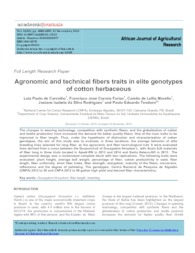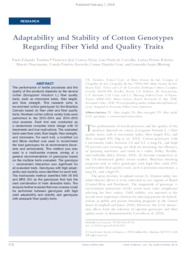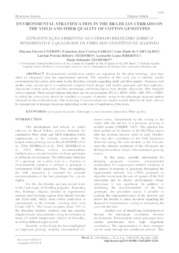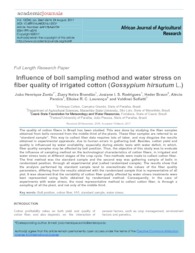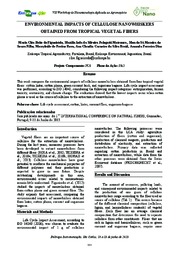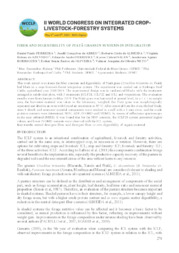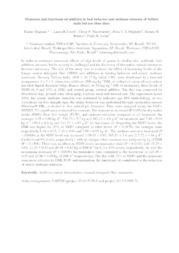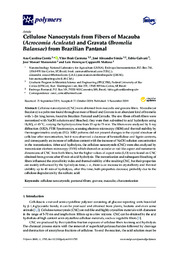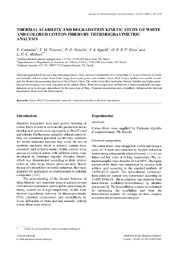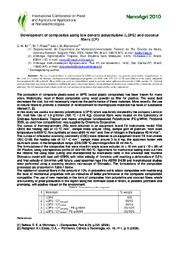Search Publications
Filter by:
| Author(s): CARVALHO, L. P. de; FARIAS, F. J. C.; MORELLO, C. de L.; RODRIGUES, J. I. DA S.; TEODORO, P. E. The changes in weaving technology, competition with synthetic fibers, and the globalization of cotton and textile production have increased the demand for better quality fibers. One of the main traits... ... |
| Author(s): TEODORO, P. E.; FARIAS, F. J. C.; CARVALHO, L. P. de; RIBEIRO, L. P.; NASCIMENTO, M.; AZEVEDO, C. F.; CRUZ, C. D.; BHERING, L. L. The performance of textile processes and the quality of the products depends on the several cotton (Gossypium hirsutum L.) fiber quality traits, such as micronaire index, fiber length, and fiber stren... ... |
| Author(s): COTRIM, M. F.; FARIAS, F. J. C.; CARVALHO, L. P. de; TEODORO, L. P. R.; BHERING, L. L.; TEODORO, P. E. Environmental stratification studies are important for the plant breeding, since they allow to adequately plan the experimental network. The objective of this work was to identify similar environments... ... |
| Author(s): ZONTA, J. H.; BRANDAO, Z. N.; RODRIGUES, J. I. S.; BRAUN. H.; PEREIRA, A.; LOURENÇO, E. R. C.; SOFIATTI, V. The quality of cotton fibers in Brazil has been studied. This was done by studying the fiber samples obtained from bolls removed from the middle third of the plants. These fiber samples are referred t... ... |
| Author(s): FIGUEIREDO, M. C. B. de; MATSUURA, M. I. da S. F.; SOUZA FILHO, M. de S. M. de; ROSA, M. de F.; BRAID, A. C. C. S.; DIAS, A. F. Resumo This work compares the environmental impacts of cellulose nanowhiskers obtained from four tropical vegetal fibers: cotton linter, cotton plume, green coconut husk, and sugarcane bagasse. Life c... ... |
| Author(s): FERREIRA, D. P.; ABREU, J. G. de; ALMEIDA, R. G. de; AZEVEDO, V. H. de; FERREIRA, E. A.; SALES, K. C.; RODRIGUES, J. A.; OLIVEIRA, E. S. B. de; OLIVEIRA NETO, V. J. de
|
| Author(s): MAGNANI, E.; TOSETI, L. B.; NASCIMENTO, C. F.; FRIGHETTO, R. T. S.; BRANCO, R. H.; LEME, P. R. In order to minimize unwanted effects of high levels of grains in feedlot diet, antibiotic feed additives are used, but its security is challenged and the discovery of alternative natural substances b... ... |
| Author(s): CORRÊA, A. C.; CARMONA, V. B.; SIMÃO, J. A.; GALVANI, F.; MARCONCINI, J. M.; MATTOSO, L. H. C. Cellulose nanocrystals (CNC) were obtained from macauba and gravata fibers. Macauba (or Bocaiuva) is a palm tree found throughout most of Brazil and Gravata is an abundant kind of bromeliab with 1-2m... ... |
| Author(s): CORRADINI, E.; TEIXEIRA, E. M.; PALADIN, P. D.; AGNELLI, J. A.; SILVA, O. R. R. F.; MATTOSO, L. H. C. Brazilian researchers have used genetic breeding of cotton fibers in order to increase the production and to develop new species more appropriate to Brazil’s soil and climate. Furthermore, naturally c... ... |
| |
Observation
Some of Embrapa's publications are published as ePub files. To read them, use or download one of the following free software options to your computer or mobile device. Android: Google Play Books; IOS: iBooks; Windows and Linux: Calibre.
Access other publications
Access the Agricultural Research Database (BDPA) to consult Embrapa's full library collection and records.
Visit Embrapa Bookstore to purchase books and other publications sold by Embrapa.

